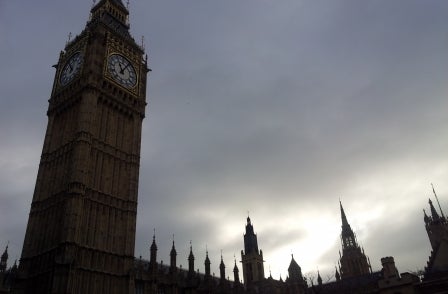
Politicians appear to moving closer to resolving the current stand-off over the future of press regulation.
George Eustice MP, one of the leaders of around 75 Tory MPs who support tougher press regulation, has written in The Guardian that the Royal Charter plan put forward by the Conservative leadership two weeks ago “represents a basis on which we can all move forward”.
This follows comments from Labour deputy leader Harriet Harman who said at the weekend “we'll definitely look at a Royal Charter but it can't be one which drives a coach and horses through Leveson, it's got to be actually delivering the standards that Leveson set forth”.
The Royal Charter (full wording here) sets out the constitution of a Recognition Panel which will effectively licence the press industry’s new self-regulation body every three years.
The main sticking-point now seems to be the extent to which that recognition body is independent of the press.
Under the current Royal Charter proposal Supreme Court justice Lord Brown of Eaton-under-Heywood will chair the appointments committee for the new Recognition Panel which will also include one person who “in his opinion” represents the publishers, someone who represents the public and a Public Appointments Assessor.
Eustice said: “The PCC failed dismally because it was controlled by the press. The essential ingredient of the Leveson plan was that there should be a self-organised regulator that was then itself held to account by a fully independent public body.”
Harman also said it was important for Labour that the press was not involved in appointments to the body that was auditing them.
So a compromise deal between the parties may see press industry involvement removed from the Recognition Panel appointments process.
This could prove to be a bitter pill to swallow for press owners.
In the one public statement they have made since the draft Royal Charter was published, the publishers' Industry Implementation Group looking at press regulation said: “we have grave reservations about the proposed arrangements for appointments to the Recognition Panel, which appear to prevent anyone with knowledge or experience of the industry at a senior level from becoming members”.
The draft Royal Charter plan says that no-one involved in the publication of news or current affairs can serve on the recognition body.
Eustice said in his Guardian piece that “an agreement is in sight”.
He said: “It needs the press to be less defensive about relinquishing control to allow a genuinely independent regulator to develop; it requires the government to puts its foot down and make clear to the press that it is not for them draft the Royal Charter; and it needs those arguing for greater accountability to show some faith in what the Royal Charter might become.”
Meanwhile, the Media Standards Trust today challenged the newspaper industry over the lack of transparency around its ongoing negotiations to create a new system of self-regulation.
It said in a statement today: “Lord Justice Leveson, in his report, strongly criticised the plan put forward by Lord Black and Lord Hunt, writing that he found it ‘extraordinary’, that ‘they did not regard public views on the matter [of their proposal] as of sufficient interest or importance to make any effort to ascertain them.’
“‘This lack of interest in the views of the public’ Leveson wrote, ‘may be symptomatic of the approach that the press has consistently taken towards regulation over many decades.’”
The MST today sent Pressbof chairman Lord Black and PCC chairman Lord Hunt six questions including: “What is the ‘Industry Implementation Group’, what is its remit, and who is on it?
“Does the industry plan to make future meetings and proposals for a new system public?
“How does the industry plan to involve the public in the development of a new system (beyond the limited consultation on the Code)?”
The last media briefing on the progress of press industry negotiations around creating a new regulator was held by Lord Hunt on 14 January. At that point he said that all publishers had agreed to sign up to a fully "Leveson compliant" regulator with the only sticking point being the legally complex area of setting up a low-cost libel arbitration service.
Email pged@pressgazette.co.uk to point out mistakes, provide story tips or send in a letter for publication on our "Letters Page" blog






